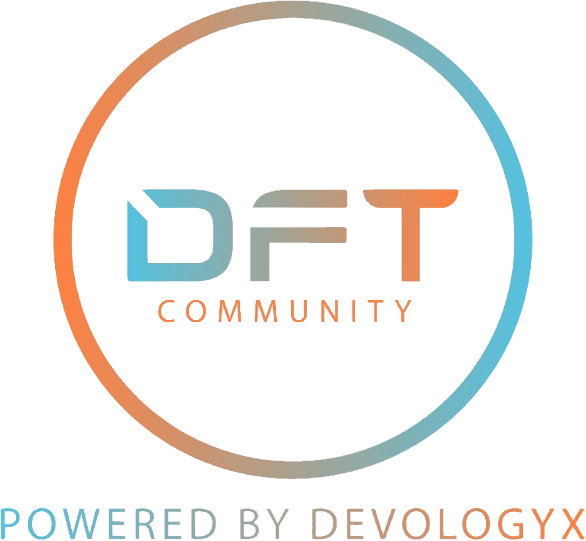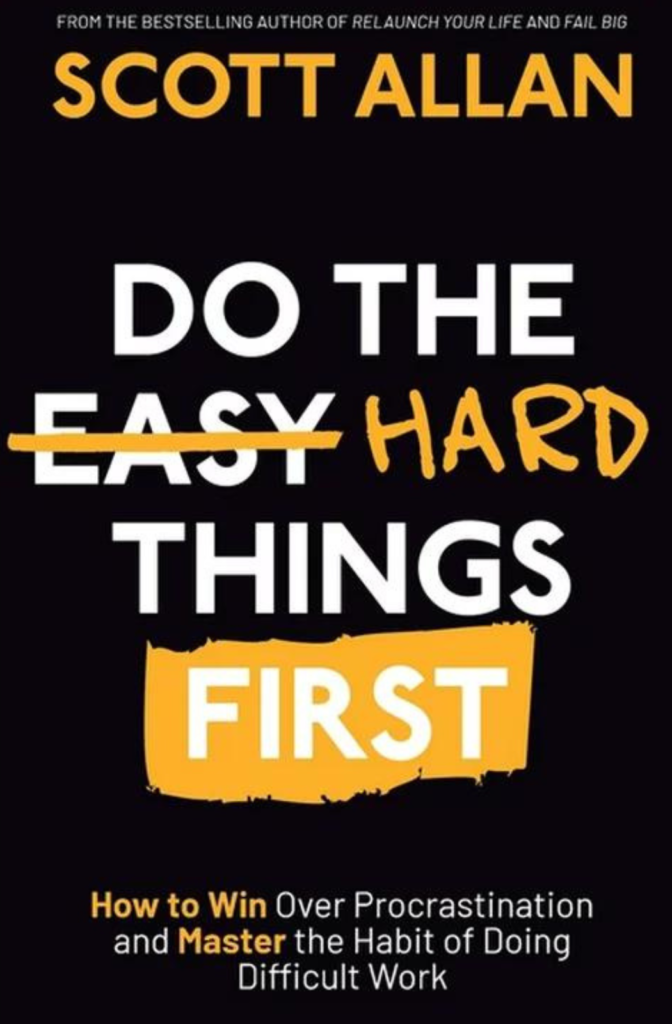Are you making slow progress compared to what you’d be making or living in chaos because you frequently put off essential tasks till the last minute? Are you disorganised both at work and at home? Do feelings of anxiety, frustration, and helplessness hit you when you think about your unfinished projects? It’s because you’re suffering from the procrastination habit, which you need to address as soon as possible. It’s, therefore, time for you to defeat this habit and reconnect your habits for doing complex work. Do The Hard Things First, written by Scott Allan, has approaches like eliminating negative self-talk, overcoming lazy tendencies and ending self-sabotage to help combat procrastination.
HOW THIS BOOK HELPED US?
Being a self-development book, Do The Hard Things helped us gain control over self-defeating distractions, and identify significant constraints that hold us back and make us postpone duties. Also, the book helped us make better choices and create greater confidence in decision-making.
EXPLAIN THE BOOK IN UNDER 60 SECONDS
Do The Hard Things First is a self-development book that discusses the procrastination habit and how to combat it. The book is structured to help you save time, increase your mental energy and teach you how to think with a mindset built with confidence by eliminating fear.
TOP THREE QUOTES
- “Procrastination is not Laziness,” I tell him. “It is fear. Call it by its right name and forgive yourself.”
- “There is nothing so fatal to character as half-finished tasks.”
- “We are what we repeatedly do. Excellence, then, is not an act but a habit.”
BOOK SUMMARIES AND NOTES
Chapter One: Breaking Fear, Minimising Excuses, and the Science of Delaying Gratification.

Dealing with and overcoming procrastination is a complex issue, but it doesn’t have to be complicated. When you find the coping strategies you favour when the procrastination habit is activated, you’ll have the edge over the old behaviour. A coping mechanism is an internal function that you have programmed to permit you to act without restraint. Knowing how you postpone important tasks leads you to better strategies to combat the problem. The real question is, “How will you respond the next time you find yourself putting something off?” Knowing how the pattern begins is crucial to turning it around. There are probably various strategies that you have used to deal with procrastination. Coping mechanisms reduce stress, anxiety, fear, guilt, and shame. They work to the degree that they regulate our negative emotions surrounding task avoidance by minimising the emotional effect of procrastination.
The cost of Self-sabotage
When you avoid doing the things that cost us our health, time, money, careers and reputation, it can cause disaster. While you have the immediate gratification of avoiding the tedious and uncomfortable task, the long-term outcome is living a life filled with fear, regret, and anxiety. The payoff has no logic, and the chronic procrastinator will lean heavily into delaying complex tasks. There is a heavy price to pay for living this way, and the bill is heading your way. But it’s not too late. You can shift this form of self-sabotage; freedom is yours when you do. Remember this: By avoiding difficult work, you choose to do something less critical, less engaging, and, chances are, less challenging. You spend more time thinking about doing it and creating excuses for why it can’t be done. When you suddenly have the time for it, you get ‘busy’ with another task.
Fear
For procrastination, fear has a strong undertow effort. Anxiety sucks you in and pulls you down. It immobilises you and makes you powerless and fearful to take any action that could result in failure, overwhelm or risk. All procrastination is hidden behind fear. It has been repeatedly suggested that procrastinating people are lazy, but this is far from the truth. Most persistent procrastinators are usually hardworking and intelligent people who want to do their best in everything. But they procrastinate out of fear because they care.
Practising task avoidance is the barrier to everything you have ever wanted, and you must break it down.
Doing the hard work is broken down into five core fears:
- Fear of Commitment
- Fear of Failure
- Fear of the Unknown
- Fear of Decision Making
- Fear of Criticism or Negative Feedback
Favourite quote of the chapter: “We lead our lives so poorly because we arrive in the present always unprepared, incapable, and too distracted for everything.”
Chapter two: Practical Steps for Doing the Hard Things First

Take Total Ownership for Behaviour Change
You are responsible for your behaviour. This is true for your habits, thoughts, actions, and decisions. You are responsible for your success, failures, and the quality of your lifestyle. When you step up and own everything, you are waiting for nothing to improve your life. You are the captain of your vessel called “successful living”, and you become a person of profound influence by taking total ownership. Everything will change when you take ownership of your procrastinating ways, including your behaviour.
Taking total ownership means analysing everything you think, say, and do. The way you think (your beliefs) feeds into how you feel (your emotions) and triggers you to act (your behaviour). The behaviour of putting off essential tasks begins with the “I’ll do it later.” fragmented thinking. And if I don’t do it, does it matter? I’m sure somebody else will.
Make Your List of Things to get done.
Think about a complex task that you avoid doing. Is it updating your financial records? Starting an exercise routine? Talking with your children about a complex subject? Updating your resume for a new job? Decluttering your computer’s desktop? Now, list the first five things that come to your mind. These could be projects you haven’t started (or finished) or something you started but gave up halfway through. Note that this is not a to-do list. You’re not doing anything yet; we are just setting things up now (planning), so we can do stuff later. It’s about getting started. Start now, and success will come your way.
Decide You’re Doing It…Now
Look at the list you created in the previous step. You have a list of at least five tasks you’ve been delaying for as long as you can remember. You might have ten items or forty-seven; it doesn’t matter. The fewer, the better, so what you should do right now is narrow the list to your top five. Your list of five items should be your top influencers. Now, select one thing from your list. This should be your big winner. Preferably, it should be something you can do today. If it requires too much time, you won’t finish it quickly and might give up. Select an item that can be performed in ten minutes or less. This will be your small win for the day. Next, decide to do this one thing. By taking the first action step, you’re making the most straightforward decision to begin.
Write It Down. Five Times.
Not only does your general recall improve when you write down things, but it is also more likely to generate success. Writing things down makes your mind more efficient by helping you focus on the critical task. It is easier to maintain focus when the job you are working on is pasted in front of you. My system for this is to write the one thing I’m working on directly onto a sticky note.
Favourite quote of the chapter: “Success is not obtained overnight. It comes in instalments; you get a little bit today, a little bit tomorrow until the whole package is given out. The day you procrastinate, you lose that day’s success.”
Chapter three: Breaking Negative Behaviour

Breaking Your Negative Conditioning
If we break it down, avoiding tackling the hard things is a deep form of negative conditioning. It didn’t start this way, but like any addiction, we begin the habit of escaping. It feels suitable for a while until, eventually, the effect wears off. We must take more of the drug (avoidance) to achieve the same impact we had last week. There are three steps you can take right now to move forward. I recommend you commit to these steps and, when you stumble, shrug it off and move forward again. We get caught up in trying to make things perfect, do it without fail, and avoid facing that failure.
- Make a decision…in the present moment.
- Sit in silence.
- Identify repetitive negative thoughts.
Breaking Anxiety and Overwhelm
Overwhelming is the feeling of intense pressure taking over your thoughts, mind and emotions. It is the feeling that you’re drowning, and no matter how hard you fight, the shore appears farther away the more you struggle. Overwhelming, and pressure can make you critically ill. It can isolate and give you heartache. If you have this harmful habit, you know the feeling. It’s time for you to stop paying a heavy price for procrastinating. To overcome overwhelm, here are a few strategies to help you keep track of your tasks:
- Focus on one task at a time
- Focus on your number one priority right now
- Practice deep breathing meditation
- Shift your self-detecting thoughts
- Write it down
Breaking Your Limiting Self-Talk
Self-talk is your inner voice. It’s switched on 24/7. While you may not focus on your internal dialogue with intention, you’ve rehearsed self-talk throughout your life. It’s your mind’s running commentary playing on autopilot in the background. It influences and creates how you see yourself and the world around you. Internal negative self-talk is damaging. It can lead to a self-defeating cycle of procrastination that lasts for decades. What you tell yourself internally is expressed in the external world as it becomes your reality. Try to replace your negative self-talk with empowering words of confidence. Your self-talk is a string of language you have been telling yourself over and over and over again. You’ve performed this repetition to the point that negative self-talk becomes your mind. You begin to believe over time, “This is who I am.”
Favourite quote of the chapter: “You have powers you never dreamed of. You can do things you never thought you could do. There are no limitations in what you can do except the limitations of your mind.”
Chapter four: Do Hard Things Everyday

Do the Hard Things Around Your Home
Broken things around home—or even if you need to fix stuff up—reduce the motivation in your home. If you’re in the habit of putting things off, the longer it stays undone, the heavier it weighs on your basis and confidence. To combat this, create a list of the things that require improvement and then start from there. Chances are, there are many things that you have turned a blind eye to and accept as usual. You tell yourself, “Oh, I can live with that.” Then you repeat the process again and again. Soon you’re using this excuse for everything, which is how you reduce your quality of life—by accepting the lowest common denominator. When you decide to do nothing about it, you’re still making a decision.
Do the Hard Things Around Your Workspace
Is there a project at work you have been avoiding? Is your desk a mess and files disorganised? Do you suffer from information overload on your computer desktop? Take thirty minutes to walk around your workspace and note everything that requires attention. Leave nothing out, no matter how small it is. Write the tasks on sticky notes and tack these up on your wall or desktop. Here are a few strategies that can help you break the mould on hard things at work:
- Identify the reason behind your resistance.
- Delegate the work you struggle with.
- Focus on your strengths and not weaknesses.
Do the Hard Things in Your Digital Space
Why do you put off doing the hard thing when decluttering your digital environment? It’s easy to ignore your digital content. Nowadays, with millions more people taking to online services and businesses through digital platforms, getting lost in the shuffle and overwhelm of digital content is easy.
If you’re like most people and spend hours a day on the computer, downloading and storing files, PDFs, videos, and pictures is a regular habit you give little thought to.
Over the years, your digital landscape can become a disorganised digital wasteland. You know you should organise this better, creating separate folders for your content, but you have so much stuff in Google Drive, Dropbox, Evernote and your Desktop that the task has become daunting. This leads to overwhelming, and when you’re overwhelmed, what do you do? Put things off for a later date.
Favourite quote of the chapter: “If you don’t pay appropriate attention to what has your attention, it will take more of your attention than it deserves.”
HOW THIS BOOK CAN HELP SOFTWARE DEVELOPERS
“Do the Hard Things First” by Scott Allan is a productivity book that provides practical strategies to overcome procrastination and increase productivity. The book can help software developers by encouraging them to tackle challenging tasks, prioritise their work, and set achievable goals. By following the book’s techniques, software developers can optimise their time, focus on their most important work, and avoid distractions, leading to better results and higher efficiency. The book emphasises the importance of breaking down complex projects into smaller, more manageable tasks and tackling the most difficult ones first.


